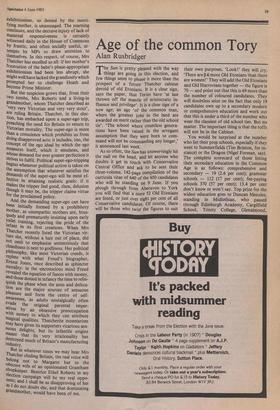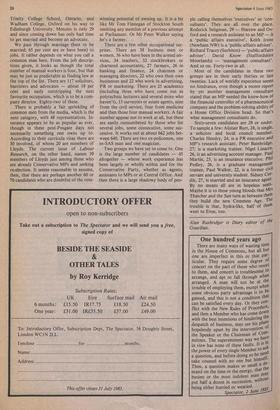Age of the common Tory
Alan Rusbridger
The Sun is pretty pleased with the way things are going in this election, and few things seem to please it more than the prospect of a future Thatcher cabinet devoid of old Etonians. It is a clear sign, says the paper, that Tories have `at last thrown off the mantle of aristocratic in- fluence and privilege'. It is a clear sign of a new age; an age 'of the common man, where the greatest jobs in the land are awarded on merit rather than the old school tie'. 'The school where countless genera- tions have been raised in the arrogant assumption that they were born to com- mand will not be commanding any longer,' it announced last week.
As so often, the Sun has unswervingly hit the nail on the head, and let anyone who doubts it get in touch with Conservative Central Office and ask to be sent their three-volume, 142-page compilation of the curricula vitae of 640 of the 650 candidates who will be standing on 9 June. If you plough through from Aberavon to York you will find that a mere 52 Old Etonians are listed, or just over eight per cent of all Conservative candidates. Of course, there will be those who twist the figures to suit
their own purposes. 'Look!' they will cry. 'There are1141more Old Etonians than there are women!' They will add the Old Etonians and Old Harrovians together — the figure is 70 — and point out that this is 69 more than the number of coloured candidates. They will doubtless seize on the fact that only 19 candidates own up to a secondary modern or comprehensive education and work out that this is under a third of the number who wear the classiest of old school ties. But no matter. The important thing is that the toffs will not be in the Cabinet.
You would be surprised at the number who list their prep schools, especially if they went to Summerfields (Tim Brinton, for in- stance) or the Dragon (Nigel Forman, say). The complete scorecard of those listing their secondary education in the Common Age is as follows: comprehensive and secondary — 19 (2.6 per cent); grammar schools — 112 (17 per cent); fee-paying schools 370 (57 per cent); 13.4 per cent don't know or won't say. Top prize for the widest education goes to Duncan Menzies, standing in Midlothian, who passed through Edinburgh Academy, Cargilfield School, Trinity College, Glenalmond, Trinity College School, Ontario, and Wadham College, Oxford on his way to Edinburgh University. Menzies is only 29 and since coming down has only had time to get married and become an advocate.
We pass through marriage (best to be married; 65 per cent are or have been) to jobs. It rather depends on what you call a common man here. From the job descrip- tions given, it looks as though the total number of manual workers is four, but that may be just as predictable as finding law at the top of the list. There are 117 solicitors, barristers and advocates — about 18 per cent and easly outstripping the next favourite occupation, which is to be a com- pany director. Eighty-two of these.
There is probably a fair sprinkling of common men from the media, which is the next category, with 48 representatives. In- surance appears to be as popular as ever, though in these post-Posgate days not necessarily something one owns up to. According to their curricula vitae there are 30 involved, of whom 20 are members of Lloyds. The current issue of Labour Research, on the other hand, names 39 members of Lloyds just among those who are already Conservative MPs and seeking re-election. It seems reasonable to assume, then, that there are perhaps another 60 or 70 candidates who are doubtful of the vote-
winning potential of owning up. It is a bit like Mr Tom Finnegan of Stockton South omitting any mention of a previous attempt at Parliament. Or Mr Peter Walker saying he's a farmer.
There are a few other occupational sur- prises. There are 38 business men or women, 36 who have been in the armed ser- vices, 34 teachers, 32 stockbrokers or chartered accountants, 27 farmers, 26 in banking and finance, 24 chairmen or managing directors, 22 who own their own businesses and 22 who work in advertising, PR or marketing. There are 25 academics (including three who have come out as polytechnic lecturers and several more who haven't), 15 surveyors or estate agents, nine from the civil service, four from medicine and then those four manual workers. A fair number appear not to work at all, but these are easily outnumbered by those who list several jobs, some consecutive, some suc- cessive. It works out at about 662 jobs bet- ween 640. There are two ex-policemen, one ex-SAS man and one magician.
Two groups we have yet to come to. One is the large number of candidates — 45 altogether — whose work experience has been largely or wholly within and for the Conservative Party, whether as agents, assistants to MPs or at Central Office. And then there is a large shadowy body of peo-
ple calling themselves 'executives' or 'con- sultants'. They are all over the place. Roderick Seligman, 29 — Harrow and Ox- ford and a research assistant to an MP — is a 'public affairs executive'. Keith Irons (Newham NW) is a 'public affairs adviser'. Richard Tracey (Surbiton) — 'public affairs adviser'. David Know (Staffordshire Moorlands) — 'management consultant'. And so on. Forty-two in all.
Most of the candidates in these two groups are in their early thirties or late twenties. Lack of worldly experience seems no hindrance, even though a recent report by yet another management consultant stated that an MP needed the know-how of the financial controller of a pharmaceutical company and the problem-solving ability of a Home Office Division head. So that's what management consultants do.
Sixty-seven candidates are 29 or under. To sample a few: Alistair Burt, 28, is single, a solicitor and local council member. Charles Hendry, 24, is a PR executive and MP's research assistant. Peter Bainbridge, 27; is a marketing trainee. Nigel Linacre, 26, is an advertising account manager. Paul Martin, 25, is an insurance executive. Phil Pedley, 26, is a graduate management trainee, Paul Walker, 22, is a former civil servant and university student. Sidney Cc:11'- We, 27, is married and an insurance agent. By no means all are in hopeless seats. Maybe it is to these young bloods that Mrs Thatcher and the Sun turn as between them they build the new Common Age. The trouble is that, hydra-like, half of them went to Eton, too.
Alan Rusbridger is Diary editor of the Guardian.















































 Previous page
Previous page